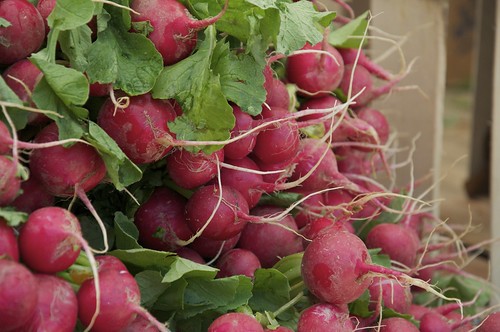May 11 2010
Food Shoppers, Paying Attention
About a week ago, my brother shared an article from Foreign Policy Magazine with me, thinking I would find it of interest. The article, "Attention Whole Foods Shoppers" by Robert Paarlberg, sparked a back and forth email conversation between my brother, husband, and myself. Writing those emails was cathartic for me and educational for my brother: I wanted to factually dispel many of the common misconceptions the article made, as many of the author’s arguments are easy to accept at face value.
After re-reading the article several times and taking a step back from the initial frustration I felt while reading it, I condensed and elaborated on our email correspondence and created my response to Mr. Paarleber’s article.
It’s important that I first address the harsh undercurrent that ran through the entire article. Throughout his piece, Mr. Paarlberg used words and phrases like ‘elite’, ‘trendy cause’, and ‘pampered’ to quickly create a dividing line between those who seek an understanding of the sources of their food and those, as implied by Mr. Paarlber, who are ‘down to earth’ enough to realize that big agriculture is the way to feed the starving. Over the years, I’ve realized that an argument is usually flawed from the beginning when the first point an author makes is one as simplistically black and white as this one.
What Mr. Paarlberg failed to acknowledge (or hasn’t had the pleasure of realizing) is that slow and sustainable are not catch phrases. Slow and sustainable food and farming is about connecting with the land in a way that is both respectful and full of humility. A slow and sustainable approach to farming recognizes the power of nature and the synergistic properties that stem from seed to plant, from soil to animal. Beyond growing food, the slow and sustainable food movement celebrates and supports local communities and creates a food culture that honors the harvest and its flavor.
Obviously a series of small farms cannot feed the world, not with the current juggernaut of crop subsidies, farm lobbyists and the few corporations that control nearly all of each majority crop, be it corn, soy, or animal processing. But a connection to the land and to one’s local farmer allows others the chance to understand the sources of their food, gives them an ability to ask questions about their food, and most importantly can generate a desire to buy their food directly from the source.
Besides, local and sustainable farming methods aren’t akin to ‘bronze age’ agricultural techniques. Many local farmers use technology and scientific knowledge in accordance with ecosystems to increase soil yield and decrease the need for fertilizers.
The only way the Tysons, Monsantos, and Cargills of the world will choose (or be forced) to loosen their hold on our entire agricultural system is for people to ‘vote with their fork’ by purchasing food from a farmers’ market, a food co-op, a local grocery store, or even growing some of their own.
I am in support of embracing modern technology. Yet our society’s current embrace is one that leads to animal abuse, environmental abuse, and even farmer suicide. Our current embrace of modern technology sacrifices the taste of our food and artificially lowers the price of certain foods.
Ultimately our world’s (and nation’s) hunger problems stem from serious flaws in food distribution, not from a lack of food or resources. The food distribution flaws are inordinately complicated due to corporations like Monsanto preventing seed saving through engineering seeds with non-renewable traits and creating patents that make seed saving illegal. This means that farmers in our country often operate more like indentured servants than farmers. This also means that farmers in other countries such as India are forced to buy uniform seeds for every planting season (seeds that they can’t afford) and switch their farming technique from a polyculture to a monoculture, which can lead to increased crop failure.
America should embrace our wealth of technology to create more ‘networks’ of small farms (modeled after successes like Niman Ranch or Bell and Evans), improve traceability and farm accountability, and distribute wealth to farmers instead of CEOs. In order for this to happen, the federal government needs to invest heavily in infrastructure and creative solutions. Will they?

